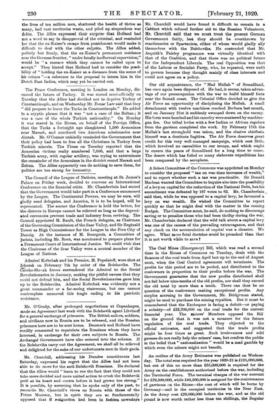The Coal Mines (Emergency) BM, which was read a second
time in the House of Commons on Tuesday, deals with the finances of the coal trade from April last up to the end of August next, when the Coal Control agreement will terminate. The profits for this period are to be pooled, and distributed to the coalowners in proportion to their profits before the war. The Government guarantee that the new profits distributed shall not fall below nine-tenths of the old profits, nor shall they exceed the old total by more than a tenth. There can thus be no question of the coalowners making exceptional profits. Any surplus accruing to the Government, Mr. Bridgeman stated, might be used to purchase the mining royalties. But it must bo remembered that the Exchequer is facing a deficit—or paying a subsidy—of £32,200,000 on the coal trade for the current financial year. The miners' Members opposed the Bill on the ground that it was not a measure for the future regulation of the coal trade. They objected to the official estimates, and suggested that the trade profits might be four times as great. Such irrelevances and wild guesses do not really help the miners' case, but confirm the public in the belief that " nationalization " would be a mad gamble by which even the miners might not benefit.


































 Previous page
Previous page